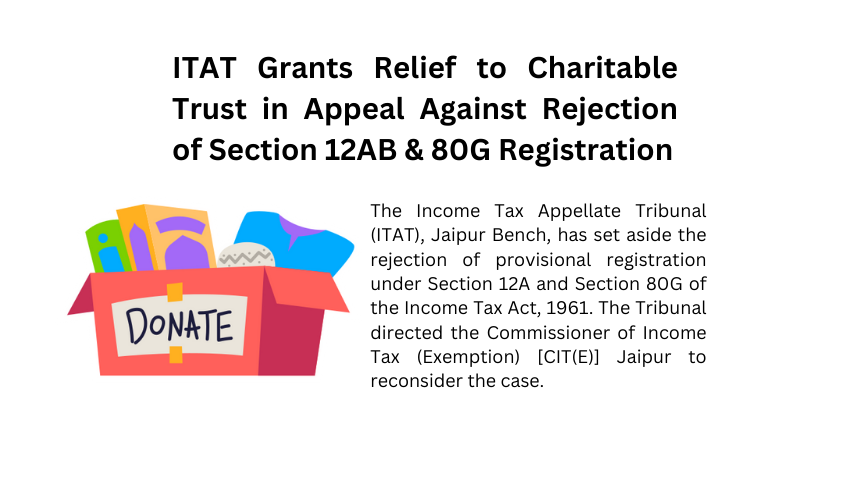In a significant ruling, the Income Tax Appellate Tribunal (ITAT), Jaipur Bench, has set aside the rejection of provisional registration under Section 12A and Section 80G of the Income Tax Act, 1961. The Tribunal directed the Commissioner of Income Tax (Exemption) [CIT(E)] Jaipur to reconsider the case.

🔎 Case Overview
| Particulars | Details |
|---|---|
| Appellant | Sankirtana Movement Trust |
| Tribunal | ITAT, Jaipur Bench |
| Section Involved | 12A & 80G of the Income Tax Act, 1961 |
| Order by CIT(E) | Application rejected due to alleged non-submission of required details |
| ITAT Verdict | Matter remanded for fresh adjudication |
📜 Background of the Case
The appellant, a charitable trust, had applied for:
-
Registration under Section 12A (for tax exemption status)
-
Approval under Section 80G (to allow donors to claim deductions)
However, the CIT(E) rejected the application, citing non-submission of required details. The trust appealed to the ITAT, arguing that it had submitted all necessary documents and had responded to the queries raised by the CIT(E).
🗐 Key Observations of ITAT
-
The CIT(E) did not properly examine the documents submitted by the appellant.
-
The rejection order lacked clarity on specific deficiencies.
-
ITAT emphasized the principle of procedural fairness, requiring authorities to allow rectifications before rejecting applications.
📈 Tribunal’s Verdict
The ITAT set aside the rejection order and directed the CIT(E) to reassess the case. The Tribunal instructed the CIT(E) to: ✔️ Provide the appellant with a fair opportunity to present its case. ✔️ Allow submission of any additional required documents. ✔️ Ensure due consideration before making a final decision.
📊 Impact of the Ruling
This ruling highlights the importance of procedural fairness in granting tax exemptions and approvals. It sets a precedent ensuring that charitable organizations are given a fair chance to comply with regulatory requirements before facing rejection.
🌟 Key Takeaways
✅ Tax authorities must follow due process before rejecting applications. ✅ Applicants should be given an opportunity to rectify deficiencies. ✅ The ruling benefits multiple charitable trusts facing similar challenges.
This decision is expected to have a positive impact on charitable organizations seeking registration and tax exemptions under Sections 12A & 80G.
